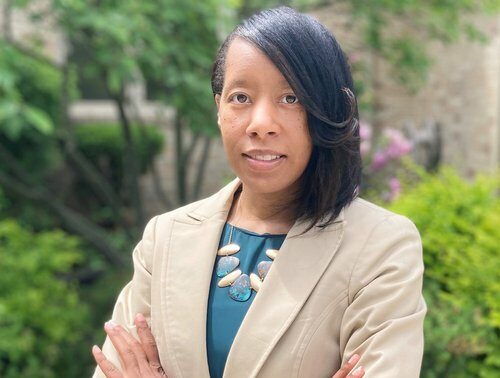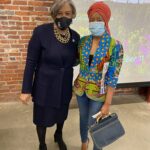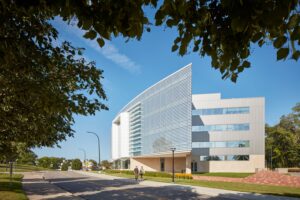
- Kim Kisner
- Community
- 07/27/2022
Laprisha Berry Daniels, Executive Director, is Committed to Alleviating Environmental Community Challenges

SBN Detroit talked to Laprisha Berry Daniels, Executive Director of Detroiters Working for Environmental Justice (DWEJ), an environmental/social justice organization committed to community engagement and policy change that lifts the voices of Detroiters.
Daniels holds a bachelor’s degree in psychology from Michigan State University, as well as master’s degrees in social work and public health from the University of Michigan. With over 20 years of public health experience, she has been responsible for developing, implementing, and evaluating efforts focused on eliminating some of the most stubborn health disparities.
Here she shares her thoughts and work in disrupting and dismantling the status quo to ultimately eliminate environmental health disparities in Detroit.
Q: In June 2021 you took on the role of executive director for Detroiters Working for Environmental Justice. What is involved here?
A: The work of Detroiters Working for Environmental Justice (DWEJ) started over 30 years ago. The vision then and now is to make certain all people benefit from environmental policies and practices that value the voices and reflect the will of impacted communities.
As the executive director, I work with internal and external partners to challenge structures/systems that perpetuate racist and classist policies that negatively impact the well-being of Detroit and Detroiters. DWEJ is currently working with national organizers and local champions to push for adding a Green Amendment to the state’s constitution.
Q: What are your short-term and longer-term goals and how will you reach them?
A: DWEJ currently focuses on reducing environmental health disparities, specifically those related to asthma, lead poisoning, and cardiovascular disease (CVD). Our approaches to reducing these disparities involve combining education about illness related to environmental hazards with political action to reduce the environmental factors that lead to disease. Two recent efforts involved engaging community members around making public comments – first, at Detroit city council meetings to object to proposed changes in a rental ordinance that would put more children at risk for having elevated blood lead levels that compromise the physical and mental health of children and pregnant persons, and second, before the zoning appeals board to urge officials to protect the health and well-being of residents by denying a permit to have a new asphalt facility in northwest Detroit.
Overall, we focus collaboration, outreach, education, and advocacy efforts on improving the natural and built environment so that the physical, spiritual, mental, and economic health of Detroiters is improved, protected, and maintained.
Q: What are the biggest challenges?
A: If Detroit is going to be a model city for sustainability, nonprofits, for-profits, industry, education systems, health systems, government, art institutions, etc. – and I think we can be – we must all work together as we look for creative and innovative solutions to challenges.
We must honor the ideas, perspectives, voices, actions, and leadership of the communities impacted by decisions that are being made. We must listen to the people in the areas we work in – the daily issues that impact their lives.
Q: What drives your passion here?
A: I believe that anyone, anywhere can collaborate for the greater good. I have been part of some unlikely alliances that have created transformative change. For example, in previous work, I was

responsible for recruiting volunteers ages 55 and up to read to elementary school students. I facilitated relationships with local motorcycle clubs and had bearded, tatted bikers volunteering to read to third graders, encouraging academic achievement and helping to improve school climate.
I’m ready to be part of that process as we focus on transforming the way we collectively “do business” as consumers and producers in Detroit.
Q: From your perspective – what is the role of businesses in Detroit in terms of sustainability overall for the city?
Businesses of all sizes with varying goals, visions, and missions can engage in co-learning, collaboration, and collective action. Many of the challenges that we are facing are the result of a few making decisions that will impact many. Therein lies the problem.
The biggest challenge to sustainability, in business and beyond, is clinging to the status quo or “business as usual.” We have to engage in some business that is unusual. For far too long the blame for environmental woes and the measures to fix the issues have been passed on to individuals.
We can shift the conversation from asking individuals to reduce, reuse, and recycle to expecting businesses, especially big businesses, to respect, restore, and replenish.
Q: What are businesses in Detroit that are doing it well?
A: Pingree Detroit comes to mind when I think of sustainability, innovation, creativity, and collaboration. They serve as a prime example of how businesses of varying sizes that have varying impacts on the ecosystem can partner.
Kim Kisner
- All
- Business
- Community
- Education
- Events

ZF Group, a global technology company with its North American headquarters in Northville, specializes in systems for passenger cars, commercial vehicles, and industrial technology. With a focus on next-generation mobility, the company develops solutions that address electrification, automation, and digitalization while aiming to improve safety, efficiency, and sustainability in transportation. SBN Detroit interviewed Anuj Shah, Sustainability Lead, for the Americas, to explore the most pressing environmental challenges in...

The Chip Bag Project, based in Detroit, is a sustainability initiative that upcycles hard-to-recycle snack packaging — particularly chip bags — into insulated sleeping bags for individuals experiencing homelessness. Founded by Eradajere Oleita, the project addresses both environmental waste and housing insecurity by transforming materials like Mylar into practical, thermally efficient solutions. In June, Oleita was among Trelllis’s 30 Under 30, its annual recognition of the brightest young...

PowerPanel, headquartered in Oxford, focuses on sustainable energy technology with a particular emphasis on hot water systems and thermal energy capture. The company designs and manufactures modular solar hybrid systems that integrate both photovoltaic and thermal components into a single unit. Its goal is to offer energy solutions that are more efficient, durable, and economically viable for a range of commercial and industrial applications. SBN Detroit interviewed Garth...







